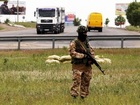Russian Foreign Minister Sergei Lavrov is to meet his German counterpart in Moscow next week for talks on the escalating conflict in Ukraine, Moscow said Thursday.
"On November 18 we are expecting a visit from German Foreign Minister Frank-Walter Steinmeier," Russian foreign ministry spokesman Alexander Lukashevich said at a televised briefing.
 Full Story
Full Story
International pressure on Russia was mounting Thursday over claims it is sending fresh military hardware into eastern Ukraine which could fuel a return to all-out conflict.
After NATO accused Russia of deploying tanks, troops and military hardware to the region, Ukraine said four of its soldiers had been killed in the past 24 hours and 18 wounded.
 Full Story
Full Story
German Foreign Minister Frank-Walter Steinmeier on Wednesday warned there are signs that pro-Russian separatists in eastern Ukraine are readying for major military clashes with troops of the Western-leaning government.
Steinmeier said there were signs, supported by Organization for Security and Cooperation in Europe (OSCE) monitors, of "new movements that indicate that the separatists are preparing for major violent confrontations".
 Full Story
Full Story
From Cheshire Cat-like grins to gloom invoking Eeyore the donkey, the diplomatic menagerie surrounding an annual Asia-Pacific summit meeting left observers with a "through the looking glass" sense of the absurd.
A week of summitry in Beijing offered insights into the diplomatic relationships -- strained as well as warm -- and the shifting dynamics of power between globetrotting leaders.
 Full Story
Full Story
NATO on Wednesday accused Russia of sending fresh columns of tanks, troops and military hardware into Ukraine as Kiev said it was preparing for a return to combat in the war-torn east.
Ukraine's warning will fuel fears of a return to all-out conflict despite a two-month-old ceasefire deal which has halted fighting along much of the frontline but not stopped shelling at strategic flashpoints.
 Full Story
Full Story
Russia on Tuesday refused to endorse a U.N. resolution on Bosnia that Moscow said would push the Balkan country towards NATO and the European Union -- a scenario that led to the conflict in Ukraine.
The U.N. Security Council adopted the resolution backing the EU military force in Bosnia despite Russia's absention, but the outcome reflected East-West tensions over Ukraine.
 Full Story
Full Story
Finnish Prime Minister Alexander Stubb warned Tuesday that the conflict in the Ukraine was bringing the world to the "brink of a Cold War" but that trade sanctions were the only credible weapon against Russia.
"Russia's foreign policy doctrine has Cold War elements," he told public broadcaster YLE.
 Full Story
Full Story
German Chancellor Angela Merkel said Tuesday that the European Union was not planning new sanctions against Russia over a fresh spike in violence in Ukraine.
Merkel reiterated that EU member states were considering adding pro-Russian separatists to existing sanction lists imposed on Moscow.
 Full Story
Full Story
International observers issued a stark warning over escalating violence in eastern Ukraine on Tuesday as Dutch investigators hoping to recover debris from a doomed airliner left the MH17 crash site with little progress.
The Organisation for Security and Cooperation in Europe (OSCE) said there was a "rising" risk that unrest in the war-torn region would get worse amid fears of a return to an all-out conflict.
 Full Story
Full Story
CNN said Monday it was suspending broadcasting in Russia "in light of recent changes in Russian media legislation," which aim to tighten control on independent news media.
A statement from CNN International parent Turner International, which is part of the Time Warner conglomerate, offered no specific timetable, but the Tass news agency reported earlier that broadcasts would cease as of December 31.
 Full Story
Full Story



